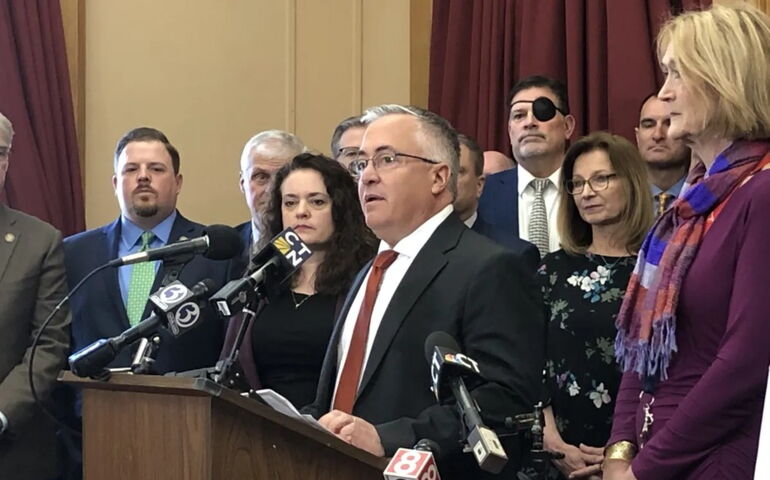Processing Your Payment
Please do not leave this page until complete. This can take a few moments.
-
News
-
Editions
-
- Lists
-
Viewpoints
-
HBJ Events
-
Event Info
- 2024 Economic Outlook Webinar Presented by: NBT Bank
- Best Places to Work in Connecticut 2024
- Top 25 Women In Business Awards 2024
- Connecticut's Family Business Awards 2024
- What's Your Story? A Small Business Giveaway 2024 Presented By: Torrington Savings Bank
- 40 Under Forty Awards 2024
- C-Suite and Lifetime Achievement Awards 2024
- Connecticut's Health Care Heroes Awards 2024
-
-
Business Calendar
-
Custom Content
- News
-
Editions
View Digital Editions
Biweekly Issues
- April 29, 2024
- April 15, 2024
- April 1, 2024
- March 18, 2024
- March 4, 2024
- February 19, 2024
- February 5, 2024
- January 22, 2024
- January 8, 2024
- + More
Special Editions
- Lists
- Viewpoints
-
HBJ Events
Event Info
- View all Events
- 2024 Economic Outlook Webinar Presented by: NBT Bank
- Best Places to Work in Connecticut 2024
- Top 25 Women In Business Awards 2024
- Connecticut's Family Business Awards 2024
- What's Your Story? A Small Business Giveaway 2024 Presented By: Torrington Savings Bank
- 40 Under Forty Awards 2024
- C-Suite and Lifetime Achievement Awards 2024
- Connecticut's Health Care Heroes Awards 2024
Award Honorees
- Business Calendar
- Custom Content
House GOP budget: Boost K-12, cut care for undocumented
 KEITH M. PHANEUF / CT MIRROR
House Minority Leader Vincent J. Candelora (at podium) and other House Republicans unveil their caucus budget at the Capitol.
KEITH M. PHANEUF / CT MIRROR
House Minority Leader Vincent J. Candelora (at podium) and other House Republicans unveil their caucus budget at the Capitol.
Minority House Republicans challenged their colleagues Thursday to balance the next state budget, pitching a $26 billion plan that prioritizes education but would end health care for undocumented women and children while continuing to downsize the state’s workforce.
The caucus plan also would plug holes involving retirement benefits and Medicaid while eliminating a highway use tax on commercial trucks and scaling back overall revenue assumptions to reflect eroding sales tax receipts. But GOP leaders also conceded there likely would be far less funds available than Democrats are seeking to invest in higher education and social services.
The Republican plan, which majority Democrats likely will oppose, also would eliminate a state agency focusing on equity issues; free phone messaging for inmates; youth employment services; and a Medicaid expansion for older adults and persons with disabilities.
The preliminary $26 billion budget the General Assembly adopted last June for the 2024-25 fiscal year is about $30 million over the spending cap and lacks adequate funding for retirement benefits and Medicaid. It also no longer reflects sales tax revenue trends, which are down by more than $200 million.
Majority Democrats have announced they won’t formally adjust that plan, despite these deficiencies.
“Not only is that an abdication of our constitutional obligation to balance the budget, it’s also a path right back to the irresponsible fiscal practices that dogged Connecticut for years,” said House Minority Leader Vincent J. Candelora, R-North Branford.
Democrats counter things aren’t that simple.
State government has more than enough money to cover all those projected holes with funds left over. But budget controls, which advocates like Gov. Ned Lamont have dubbed “fiscal guardrails,” require the state to save those funds, not spend them. Those saved dollars then could be used to pay down state pension debt or to build budget reserves.
But Candelora said if the legislature abandons these controls, it risks pushing finances into the red sooner than many would imagine.
Potential holes in next fiscal year’s finances are in the range of $500 million to $600 million, while the savings cushions in the guardrails system stand at $750 million — and could grow next week when revenue estimates are updated.
Democrats also want to spend hundreds of millions of dollars in emergency federal pandemic relief to cover ongoing expenses next fiscal year in higher education, social services and health care. And once those dollars are exhausted after next year, the state could be staring at deficits once again, Candelora said.
Investing in K-12 and early childhood education
So what can Connecticut afford in its next budget while balancing the books and following the guardrails system?
The House GOP plan would spend about $53 million less than Lamont proposed in February and fall under the spending cap by $43.5 million.
It would retain the $150 million investment in K-12 education the General Assembly endorsed last June for 2024-25 while boosting by $79.5 million payments to districts to cover special education costs.
Another $7 million would be used to boost Medicaid rates supporting the Birth to 3 program and $12 million to bolster CT Care 4 Kids program, a partnership between the state and various child care services.
The preliminary state budget for 2024-25 underfunded the state’s required annual contribution to the pension system for municipal teachers by $43 million, and the House GOP plan would plug that hole.
Rep. Tammy Nuccio of Tolland, ranking House Republican on the Appropriations Committee, noted the caucus budget includes close to $300 million in new spending for local education compared with the current fiscal year.
“If that’s not a headline, I don’t know what else is,” she said.
Eliminating the highway mileage tax on commercial trucks
Rep. Holly Cheeseman of East Lyme, ranking House Republican on the tax-writing Finance, Revenue and Bonding Committee, said her caucus also focused on the latest healthy surplus that the state budget’s Special Transportation Fund is accruing.
The Lamont administration estimated earlier this month that the $2.15 billion STF, which represents about 9% of the overall state budget, is projected to close the fiscal year on June 30 with $246 million or 11.5% left over.
The administration has faced criticism over the past few years for not accelerating Connecticut’s rebuild of its aging transportation infrastructure. The STF, which covers debt service on the borrowing that pays for much of that capital work, is on pace for its third successive year of a surplus topping 10%.
The GOP says Connecticut could easily afford to repeal the highway mileage tax on large commercial trucks, which would cost the STF $66 million next fiscal year. Critics of the levy say it exacerbates inflation on groceries and other goods shipped by truck.
Lamont, who proposed the tax two years ago, says it ensures out-of-state trucking firms help pay for the damage their vehicles do to Connecticut highways.
Cuts to health care and state agency staffing
But to prioritize local education and close holes in the budget, Republicans had to give in other areas.
The caucus proposed ending all Medicaid coverage for undocumented children. It also would eliminate coverage for postpartum services for undocumented women. These steps would save almost $46 million next fiscal year.
Another $8 million would be saved by scrapping an expansion of the HUSKY C program, which serves older adults and people with disabilities.
House Majority Leader Jason Rojas called the proposal to cut Medicaid for undocumented children “misguided.”
“I think that’s one of the bigger expenditure cuts that they make — for undocumented individuals,” he said. “I think politically that works for them. I think, ethically, and as a human, these are individuals who need health care, and all of us will pay for it one way or another.”
House Speaker Matt Ritter declined to assess it in detail Thursday morning, noting his office had just received it.
“We’ll take a look at it,” he added. “If they have good ideas, we will always look at them.”
But as for embracing any House Republican proposals before the regular legislative session ends on May 8, Ritter added, “at this late hour, it might be difficult.”
Rank-and-file Democratic legislators also likely would oppose House Republican efforts to eliminate the state Commission on Women, Children, Seniors, Equity & Opportunity, and to cancel $227,000 reserves for inflationary-adjustment races for legislators and constitutional officers.
And a key part of the Democrats’ base, state employee unions, is expected to object to a House Republican proposal to save $26.1 million next fiscal year by eliminating vacant positions. The state’s workforce is down 22% from 15 years ago, and union leaders say many agencies and departments are dangerously understaffed.
Lamont, a Democrat, said through budget spokesman Chris Collibee that “We appreciate their [House Republican] efforts to propose budget adjustments for FY 2025. While we may not agree with all of the adjustments that House Republicans have proposed, the legislature has signaled that it will maintain the adopted budget for FY 2025 without revision. To that end, we are working with legislative leadership to address resources for priorities in the coming year while maintaining adherence to the governor’s commitment to an honestly balanced budget.”
GOP: No added funds for higher education without a balanced budget
Republicans concede their plan leaves little extra to invest next fiscal year in higher education and social services unless they are willing to use temporary federal pandemic grants to help.
Lamont has identified about $200 million in funds that must be used before Dec. 31. But public colleges and universities as well as the nonprofit community agencies that deliver most social services are seeking ongoing aid to help with ongoing costs.
Candelora said the state budget, given the restrictions placed by the fiscal guardrails, simply doesn’t allow any more spending that could help these groups.
Emergency pandemic relief can be spent outside of the budget and the fiscal controls. But if it’s dedicated to cover ongoing expenses in 2024-25, that only would create a problem one year later, when those pandemic grants have been exhausted.
Candelora said Republicans are willing to support using some pandemic grant funds to assist higher education and social services but only if Democrats agree to other cuts necessary to close all financial holes in the next state budget.
CT Mirror staff writer Mark Pazniokas contributed to this report.

2022 Giving Guide
This special edition informs and connects businesses with nonprofit organizations that are aligned with what they care about. Each nonprofit profile provides a crisp snapshot of the organization’s mission, goals, area of service, giving and volunteer opportunities and board leadership.
Learn more
Subscribe
Hartford Business Journal provides the top coverage of news, trends, data, politics and personalities of the area’s business community. Get the news and information you need from the award-winning writers at HBJ. Don’t miss out - subscribe today.
Subscribe
2024 Book of Lists
Delivering Vital Marketplace Content and Context to Senior Decision Makers Throughout Greater Hartford and the State ... All Year Long!
Read Here-
2022 Giving Guide
This special edition informs and connects businesses with nonprofit organizations that are aligned with what they care about. Each nonprofit profile provides a crisp snapshot of the organization’s mission, goals, area of service, giving and volunteer opportunities and board leadership.
-
Subscribe
Hartford Business Journal provides the top coverage of news, trends, data, politics and personalities of the area’s business community. Get the news and information you need from the award-winning writers at HBJ. Don’t miss out - subscribe today.
-
2024 Book of Lists
Delivering Vital Marketplace Content and Context to Senior Decision Makers Throughout Greater Hartford and the State ... All Year Long!
ABOUT
ADVERTISE
NEW ENGLAND BUSINESS MEDIA SITES
No articles left
Get access now
In order to use this feature, we need some information from you. You can also login or register for a free account.
By clicking submit you are agreeing to our cookie usage and Privacy Policy
Already have an account? Login
Already have an account? Login
Want to create an account? Register
Get access now
In order to use this feature, we need some information from you. You can also login or register for a free account.
By clicking submit you are agreeing to our cookie usage and Privacy Policy
Already have an account? Login
Already have an account? Login
Want to create an account? Register






0 Comments